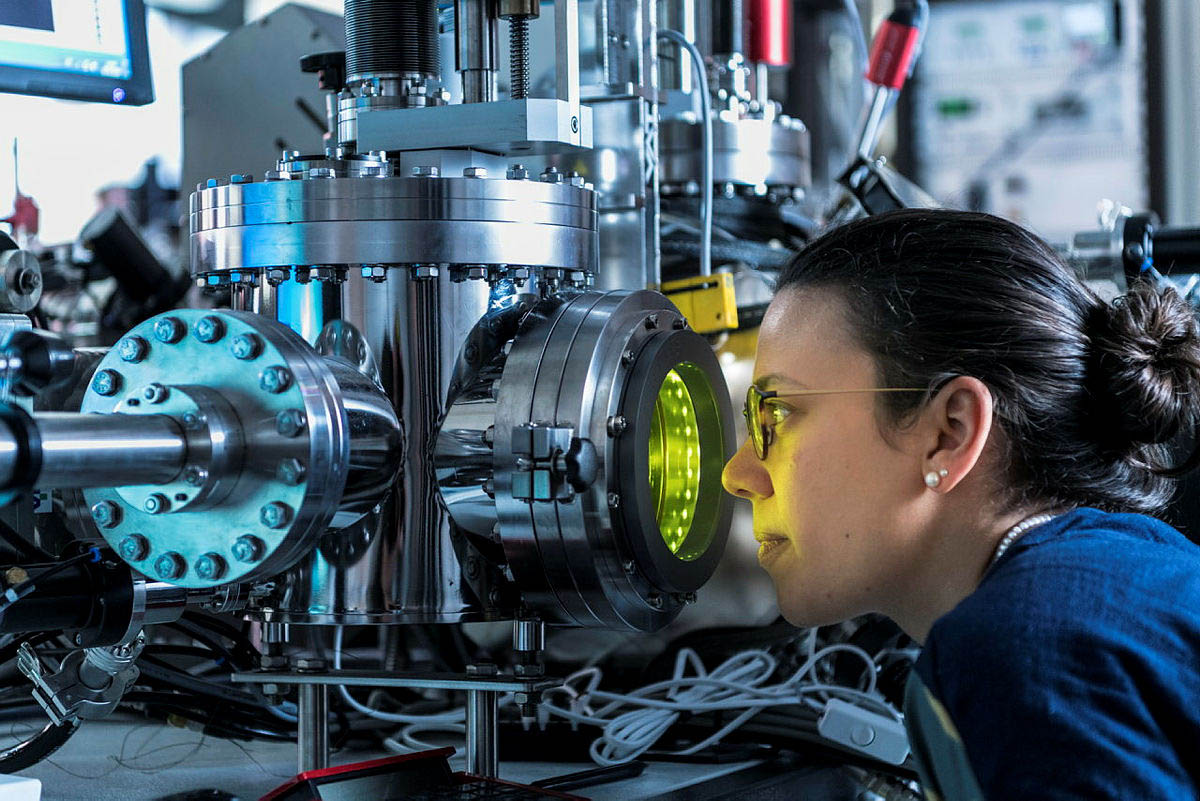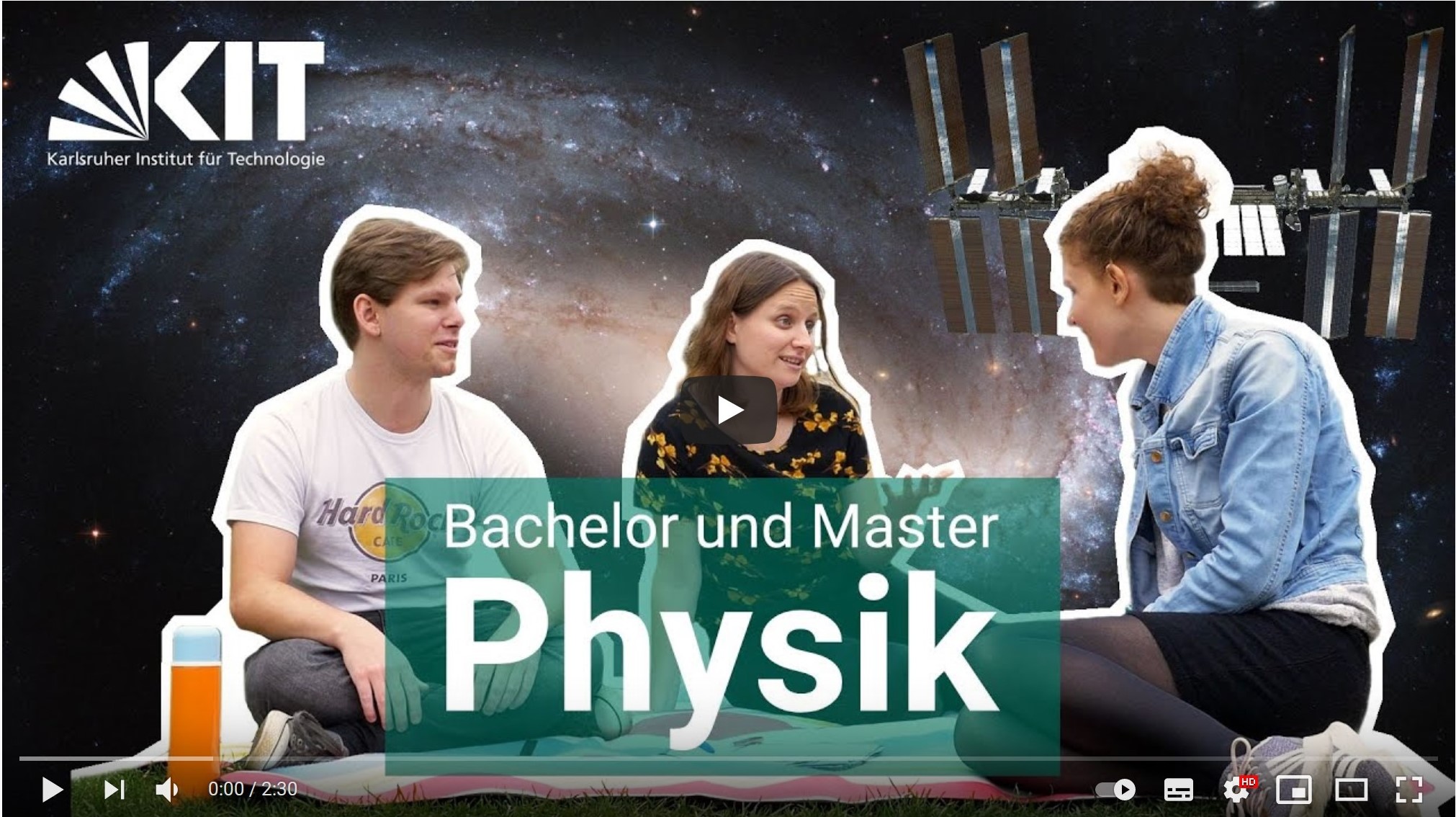Degree: Master of Science (M.Sc.)
Regular program length: 4 semester (full-time program)
Credit points (ECTS): 120 credit points
Language of instruction: English
Higher semester: no
Higher semester: winter and summer term
First semester: September 30 for winter term, March 31 for summer term
Higher semester: September 30 for winter term, March 31 for summer term
First semester: July 15 for winter term, January 15 for summer term
Higher semester: July 15 for winter term, January 15 for summer term
Program details
Program structure
In the English-language master's degree program, you will deepen and expand the basic scientific qualifications in experimental and theoretical physics that you acquired during your bachelor's degree and develop your knowledge and skills into an individual skills profile.
You start building your profile in the first year of study by choosing from a wide range of modules within the framework of a major and a second major in physics and a minor in physics.
You can choose the modules of the major subject (with a total of 20 CP) from this range of topics:
Condensed Matter
Nano-Physics
Optics & Photonics
Experimental Particle and Astroparticle Physics, Cosmology
Theoretical Particle Physics
Condensed Matter Theory
Within the second major and minor subjects (14 and 8 CP in total), you will deepen your knowledge of further sub-disciplines from the above-mentioned subject areas, such as Solid-State Optics, Nanotechnology, Quantum Information, Methods of Data Analysis, Accelerator Physics, Cosmology, Supersymmetry, etc. or you can choose suitable courses from Geophysics or Meteorology.
A non-physical compulsory elective subject (8 CP, semester 2) also contributes to your profile development in the Mmaster's degree Program. You can choose the elective from the natural sciences and engineering and thus, for example, build on the compulsory elective subjects of the bachelor's degree program from the disciplines of mathematics, chemistry, electrical engineering and information technology, mechanical engineering, computer science or economics.
The program also includes an advanced lab course (6 CP, semester 1) and the acquisition of interdisciplinary qualifications (4 CP, semester 2). For the master's thesis (30 CP), for which you prepare with an introduction to scientific work and a specialization phase, you have a processing time of 6 months.
The department recommends starting your studies in the winter semester. Applicants with non-EU citizenship should apply as early as possible.
Qualification profile of the graduate
Graduates of the Master's degree in physics know the basics of experimental and theoretical physics and have deepened their knowledge to the latest scientific findings through the study of the Major in Physics, the Second Major in Physics and the Minor in Physics. They have knowledge in a non-physics elective subject which they can choose from mathematics, the natural sciences and engineering according to their preferences. They have the abilities to apply the more complex concepts in theoretical and experimental physics to research-related problems and can develop solution strategies. On the experimental side the graduates have the ability to draw conclusions using measured data, formulate models and make predictions. Graduates specialized in theoretical physics have the knowledge to perform complex calculations. They can interpret their results in the context of theoretical models. Based on the acquired knowledge they correctly categorize various situations and topics. The graduates have the expertise to summarize their scientific results in written and oral form and they can present them using engaging presentation skills. The successful completion of the degree course enables the graduates to work in various areas, such as research and development at universities or in industry, data analysis and optimization of processes, and programming and hardware applications. Moreover, the graduates have gained the requirements to begin doctoral studies in physics. At KIT there is special emphasis on research-related teaching. In the Master's degree program the students have a wide choice among different topics. This allows students to deepen the knowledge in close contact with research performed not just at a university but at a large-scale research institution.
Career prospects
With a master's degree in physics, you can start your career in a variety of fields, e.g. in university and industrial research and development, in data analysis and process optimization, as well as in program and hardware development, management consulting, the insurance industry or in the patent system. A scientific career, starting with a doctorate, is also a possible career path that you can take after the master's program.
Characteristic features of the degree program
Characteristic features of Physics M.Sc. at KIT
curriculum based on an exceptionally broad range of scientific topics that can be tailored to personal interests
research focus: Particle and Astroparticle Physics, Quantum Materials and Systems, Optics and Photonics, Geophysics as well as Meteorology and Climate Physics
great variety in non-physical electives (natural sciences, engineering, computer science or economics)
a combination of university education and research at large-scale facilities that is unique in Germany in terms of quality
integration into the Eucor university network enables participation in courses at the universities of Freiburg, Basel, Strasbourg, Colmar and Mulhouse
possibility of a Franco-German double master's degree with the Université Grenoble Alpes and the École Nationale Supérieure de Physique, Électronique, Matériaux
for future doctoral students: Karlsruhe House of Young Scientists (KHYS)
What KIT has to offer
- central campus close to the city forest and right next to the city center
- 24-hour library offering single and group working places
- wide range of inexpensive catering options (dining hall, cafeteria, Koeri and Pizzawerk)
- numerous interdisciplinary offers for personal and professional development, e.g. Lernlabor, Schreiblabor and Perspektivenlabor
- study abroad, e.g. via Erasmus
- excellent university sports facilities with a large selection of sports
- comprehensive cultural offerings with university orchestras, choirs and theater groups
- extensive support for career entry and self-employment
- internationally oriented degree programs and diverse exchange programs
- modern laboratories and practical teaching methods
- Lernraum app
- diverse student initiatives, clubs and opportunities to actively participate in campus life
- stay in touch after graduation via the alumni network
Admission and language requirements
Admission requirements
The requirements for admission to the master's degree program in Physics are based on the current admission regulations:
- bachelor's degree
a passed bachelor's degree or at least an equivalent degree in Physics or a related degree program with essentially the same content at a university, university of applied sciences, university of cooperative education or at a foreign university. The degree must have been completed within a standard period of study of at least three years and with a minimum number of 180 credit points (CP) in accordance with ECTS - minimum knowledge and minimum achievements in the subjects
- Theoretical Physics (Mechanics, Electrodynamics, Quantum Mechanics, Statistical Physics) amounting to at least 32 ECTS credits
- Experimental Physics (Mechanics, Electrodynamics, Optics, Thermodynamics, Atomic Physics, Molecular Physics, Nuclear Physics, Solid State Physics) amounting to at least 32 ECTS credits
- Physics lab courses worth at least 18 ECTS credits
If you are applying with fewer than 82 ECTS credits in Theoretical Physics, Experimental Physics and Physics Internships, but at least 30 ECTS credits in Theoretical Physics, 30 ECTS credits in Experimental Physics and 15 ECTS credits in Physics lab courses, you have the opportunity to prove your knowledge in an interview in accordance with Section 6 of the admission regulations. - Theoretical Physics (Mechanics, Electrodynamics, Quantum Mechanics, Statistical Physics) amounting to at least 32 ECTS credits
- Letter of motivation
a letter of motivation (approx. 1000-3000 characters) in German or English, in which you explain your motivation for studying in the master's program in Physics at KIT - Proof of entitlement to an examination
proof that you have not definitively failed an examination required by the examination regulations in the master's degree program in Physics or a related degree program with essentially the same content and that you are still entitled to an examination
Language requirements and certificates
For the master's degree program in Physics, you need very good knowledge of English, which must correspond to at least level B2 of the Common European Framework of Reference for Languages (CEFR).
Proof of sufficient English language skills
The following is sufficient proof of your English language skills
- your Abitur certificate, if you have taken English for at least five years up to graduation and your final or average grade of the last two years of English lessons corresponds to at least the German grade 4 (sufficient) or at least 5 points or
- a degree from a university with English as the sole language of instruction and examination, whereby English must be the only and official language of the completed degree program noted in the diploma supplement, the transcript of records or the degree certificate
Otherwise, only the internationally recognized English tests listed in the KIT admission and enrollment regulations are accepted as proof. These are
Test of English as Foreign Language (TOEFL) with at least 90 points in the internet-based test or
IELTS with an overall score of at least 6.5 and no section below 5.5 or
University of Cambridge Certificate in Advanced English (CAE) or
University of Cambridge Certificate of Proficiency in English (CPE) or
UNIcert at least level II
In addition to the above-mentioned language certificates, the following proof is also accepted:
- a university entrance qualification from a school where teaching is exclusively in English, whereby English must be confirmed as the sole and official language by the school management.
In addition, other proofs than those listed above may be accepted on request in individual cases. The decision on this is made by the admissions commission upon application.
Please note:
Language certificates are extremely important application documents that can prevent your enrollment if you do not submit them on time. Therefore, check early on in the application process whether you have the necessary language certificates for your degree program and, if necessary, plan to take one of the language tests mentioned above. The deadline by which you must submit language certificates corresponds to the enrollment deadline stated in your admission offer. In justified cases, you can apply for an extension of this deadline. The extension can be granted until the start of the lecture period at the latest.
Application portal
Application for the 1st semester
Application for a higher semester
Contacts
Student advisor
Student advisory services (ZSB)


Karlsruher Institut für Technologie (KIT)
Zentrale Studienberatung (ZSB)
Engelbert-Arnold-Str. 2
76131 Karlsruhe
Karlsruher Institut für Technologie (KIT)
Studierendenservice
Kaiserstr. 12
76131 Karlsruhe
First point of contact for international applicants
Karlsruher Institut für Technologie (KIT)
International Students Office (IStO)
Adenauerring 2
76131 Karlsruhe
Printed matter
Module handbook
Statutes and regulations
| Titel | Stand | Download |
|---|---|---|
| 2023 KIT 013 Satzung für den Zugang zu dem Masterstudiengang Physics am Karlsruher Institut für Technologie (KIT) | 28.02.2023, veröffentlicht 28.02.2023 |
| Titel | Stand | Download |
|---|---|---|
| 2023 KIT 021 Studien- und Prüfungsordnung des Karlsruher Instituts für Technologie (KIT) für den Masterstudiengang Physics | 09.03.2023, veröffentlicht 09.03.2023 | |
| 2023 KIT 032 Berichtigung der Studien- und Prüfungsordnung des Karlsruher Instituts für Technologie (KIT) für den Masterstudiengang Physics | 20.04.2023, veröffentlicht 20.04.2023 | |
| 2025 KIT 012 Satzung zur Änderung der Studien- und Prüfungsordnungen des Karlsruher Institut für Technologie (KIT) aufgrund der Neugestaltung der Abschlussdokumente | 26.02.2025, veröffentlicht 27.02.2025 |
Teaching calendar
WT 2024/25
10-21-2024 to 02-15-2025
ST 2025
04-22-2025 to 08-02-2025
WT 2025/26
10-27-2025 to 02-21-2026
ST 2026
04-20-2026 to 08-01-2026
WT 2026/27
10-26-2026 to 02-20-2027
ST 2027
04-19-2027 to 07-31-2027
WT 2027/28
10-25-2027 to 02-19-2028
ST 2028
04-18-2028 to 07-29-2028
Lectures will not take place:
- From 12-24 to 01-06
- the week after Pentecost
- on all public holidays in the state of Baden-Wuerttemberg





